Impact of Legislations and Ethics on Travel and Tourism Sector
VerifiedAdded on 2020/11/23
|21
|8204
|177
Report
AI Summary
This report delves into the critical aspects of legislations and ethics within the travel and tourism sector, with a specific focus on the TUI Group. It begins by outlining the legal and regulatory frameworks that govern the industry, including health, safety, and security legislation, as well as laws related to equality. The report analyzes the impact of these principles on the sector, emphasizing the importance of health and safety regulations and the role of the Equality Act 2010. It then explores ethical dilemmas faced by the industry, such as cross-cultural challenges and the influence of political instability, and concludes with an examination of corporate social responsibility (CSR) practices, particularly those of the TUI Group. The report highlights the need for adherence to ethical standards and legal requirements to ensure the safety, security, and fair treatment of both employees and customers.
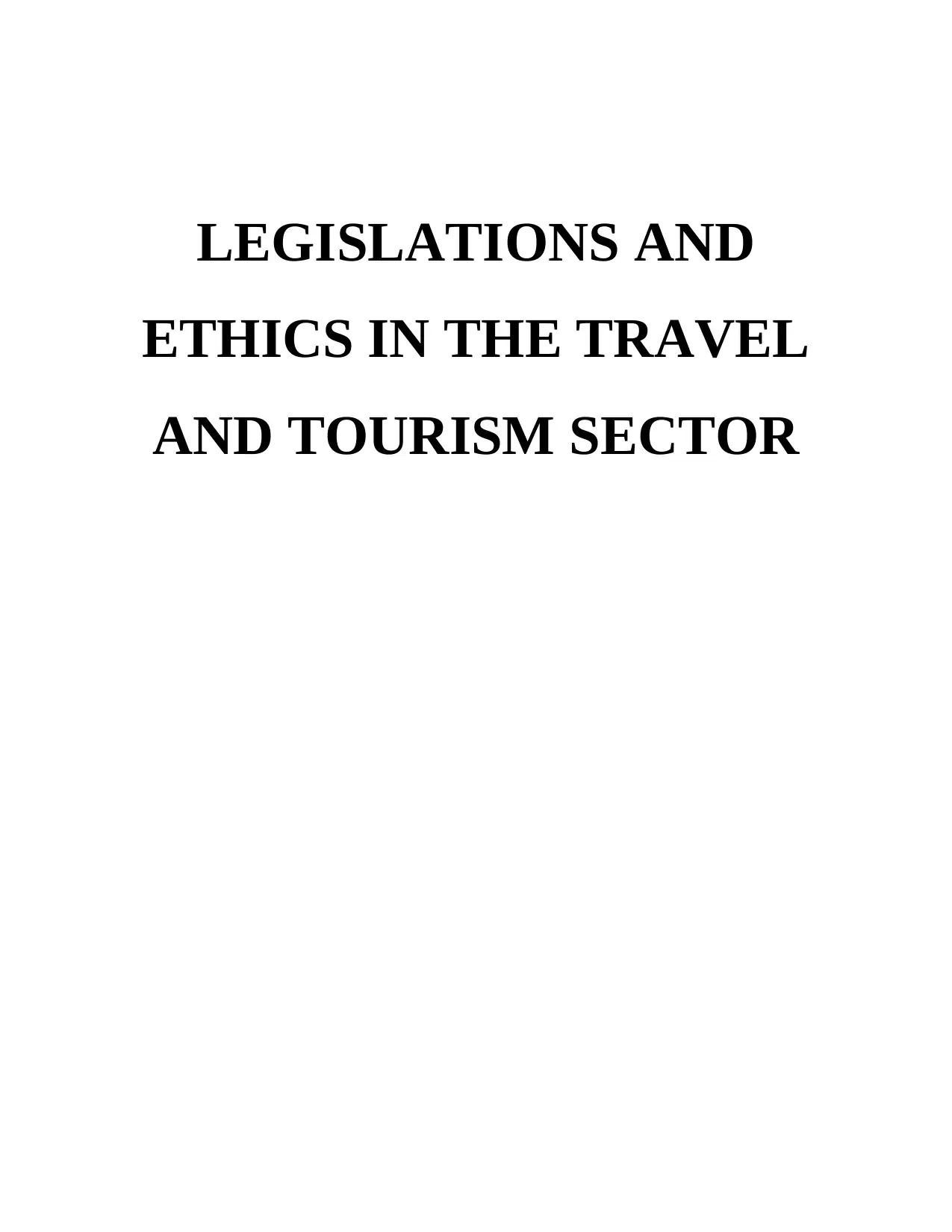
LEGISLATIONS AND
ETHICS IN THE TRAVEL
AND TOURISM SECTOR
ETHICS IN THE TRAVEL
AND TOURISM SECTOR
Paraphrase This Document
Need a fresh take? Get an instant paraphrase of this document with our AI Paraphraser
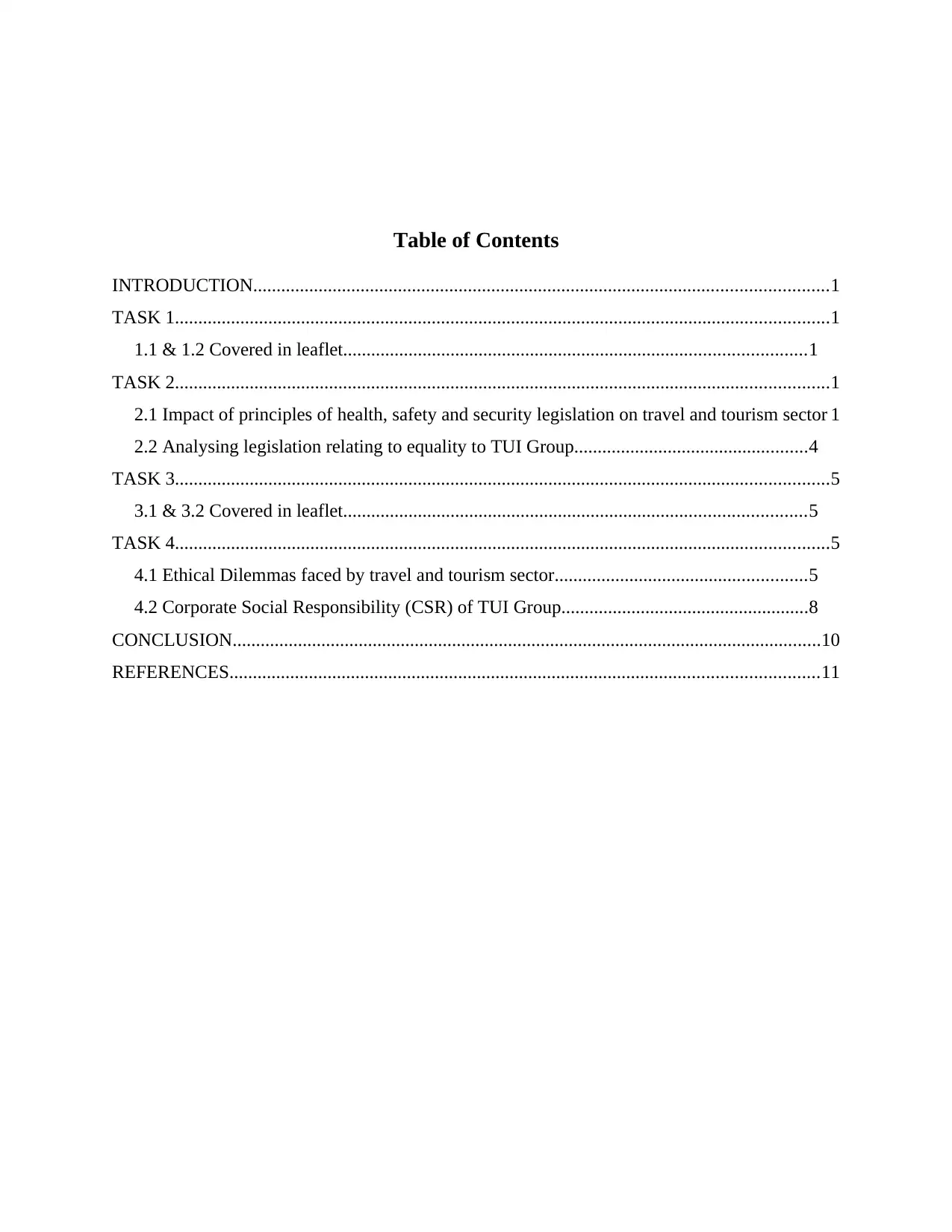
Table of Contents
INTRODUCTION...........................................................................................................................1
TASK 1............................................................................................................................................1
1.1 & 1.2 Covered in leaflet...................................................................................................1
TASK 2............................................................................................................................................1
2.1 Impact of principles of health, safety and security legislation on travel and tourism sector 1
2.2 Analysing legislation relating to equality to TUI Group..................................................4
TASK 3............................................................................................................................................5
3.1 & 3.2 Covered in leaflet...................................................................................................5
TASK 4............................................................................................................................................5
4.1 Ethical Dilemmas faced by travel and tourism sector......................................................5
4.2 Corporate Social Responsibility (CSR) of TUI Group.....................................................8
CONCLUSION..............................................................................................................................10
REFERENCES..............................................................................................................................11
INTRODUCTION...........................................................................................................................1
TASK 1............................................................................................................................................1
1.1 & 1.2 Covered in leaflet...................................................................................................1
TASK 2............................................................................................................................................1
2.1 Impact of principles of health, safety and security legislation on travel and tourism sector 1
2.2 Analysing legislation relating to equality to TUI Group..................................................4
TASK 3............................................................................................................................................5
3.1 & 3.2 Covered in leaflet...................................................................................................5
TASK 4............................................................................................................................................5
4.1 Ethical Dilemmas faced by travel and tourism sector......................................................5
4.2 Corporate Social Responsibility (CSR) of TUI Group.....................................................8
CONCLUSION..............................................................................................................................10
REFERENCES..............................................................................................................................11

⊘ This is a preview!⊘
Do you want full access?
Subscribe today to unlock all pages.

Trusted by 1+ million students worldwide

INTRODUCTION
Every business organisation needs to follow various legislation and regulations provided by the government and legal authorities. Travel
and tourism sectors needs to also follow ethics and legislations in order to provide safety and security to customers and society. Different travel
agencies, travel organisations, airports, etc. are part of the travel and tourism sector who has to follow general laws and frameworks provided by
the government and legal authorities. Tourism laws and legislations evolves health and safety, employees rights, consumer protection rights,
company law, environment protection regulations and contract law.
TUI Group is German tourism and travel organisation and it is considered as the best leisure and tourism business in the world. TUI
Group stands for Tourism Union International. Its headquarter is situated in Hannover, Germany. TUI Group owns various hotels, travel
agencies, cruise ships, airlines and retail stores. The following report explains different legal and regulatory frameworks of travel and tourism
sector and laws relating to equality. Contract legislation and consumer protection legislation are also explained. Various ethical dilemmas faced
by travel and tourism industry are discussed in the report in order to avoid common mistakes and for enhancing tourism services quality. There
are different factors discussed in the report that bring influences and also contributes for development of travel and tourism industry.
TASK 1
1.1 & 1.2 Covered in leaflet
1
Every business organisation needs to follow various legislation and regulations provided by the government and legal authorities. Travel
and tourism sectors needs to also follow ethics and legislations in order to provide safety and security to customers and society. Different travel
agencies, travel organisations, airports, etc. are part of the travel and tourism sector who has to follow general laws and frameworks provided by
the government and legal authorities. Tourism laws and legislations evolves health and safety, employees rights, consumer protection rights,
company law, environment protection regulations and contract law.
TUI Group is German tourism and travel organisation and it is considered as the best leisure and tourism business in the world. TUI
Group stands for Tourism Union International. Its headquarter is situated in Hannover, Germany. TUI Group owns various hotels, travel
agencies, cruise ships, airlines and retail stores. The following report explains different legal and regulatory frameworks of travel and tourism
sector and laws relating to equality. Contract legislation and consumer protection legislation are also explained. Various ethical dilemmas faced
by travel and tourism industry are discussed in the report in order to avoid common mistakes and for enhancing tourism services quality. There
are different factors discussed in the report that bring influences and also contributes for development of travel and tourism industry.
TASK 1
1.1 & 1.2 Covered in leaflet
1
Paraphrase This Document
Need a fresh take? Get an instant paraphrase of this document with our AI Paraphraser
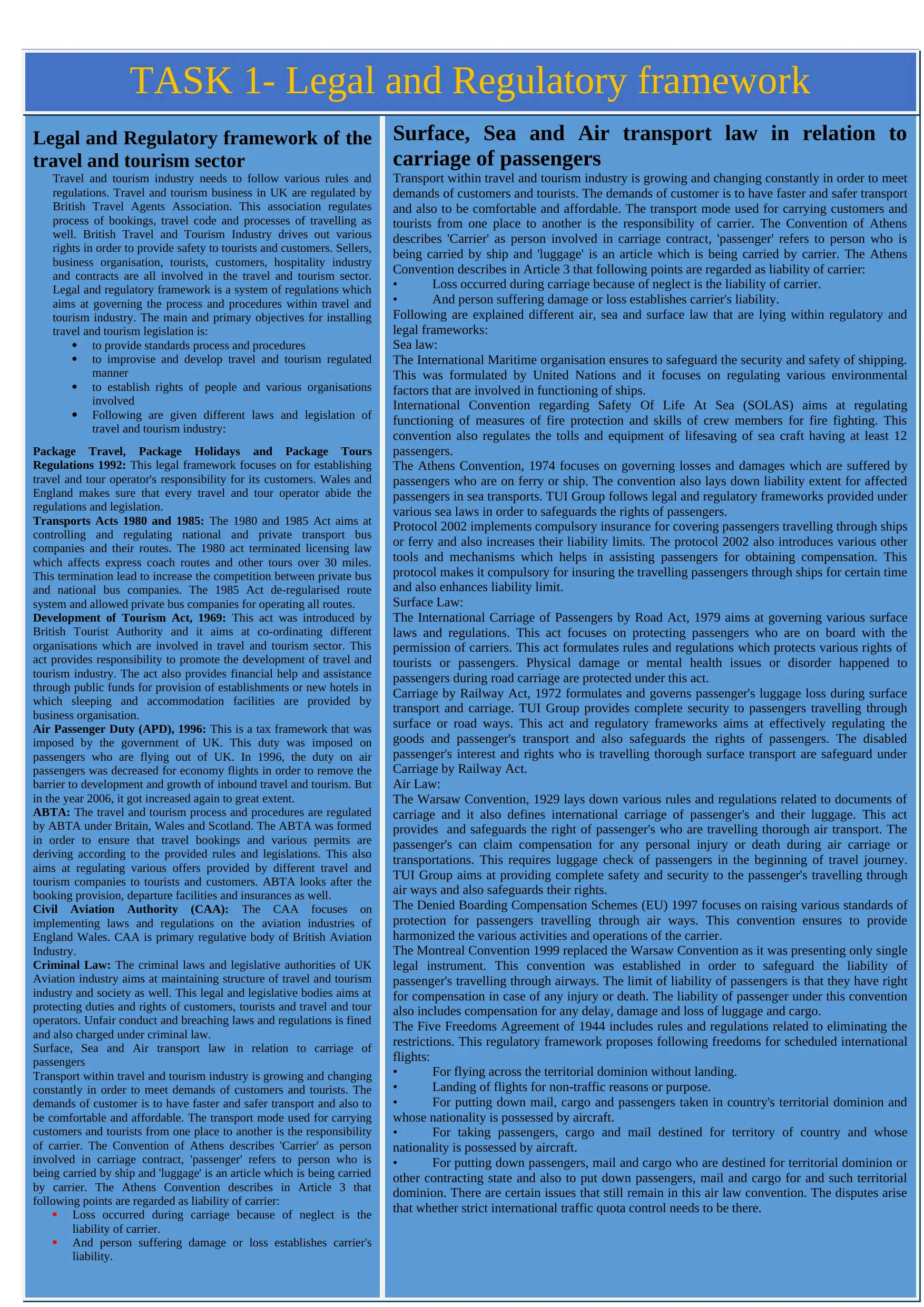
2
Legal and Regulatory framework of the
travel and tourism sector
Travel and tourism industry needs to follow various rules and
regulations. Travel and tourism business in UK are regulated by
British Travel Agents Association. This association regulates
process of bookings, travel code and processes of travelling as
well. British Travel and Tourism Industry drives out various
rights in order to provide safety to tourists and customers. Sellers,
business organisation, tourists, customers, hospitality industry
and contracts are all involved in the travel and tourism sector.
Legal and regulatory framework is a system of regulations which
aims at governing the process and procedures within travel and
tourism industry. The main and primary objectives for installing
travel and tourism legislation is:
to provide standards process and procedures
to improvise and develop travel and tourism regulated
manner
to establish rights of people and various organisations
involved
Following are given different laws and legislation of
travel and tourism industry:
Package Travel, Package Holidays and Package Tours
Regulations 1992: This legal framework focuses on for establishing
travel and tour operator's responsibility for its customers. Wales and
England makes sure that every travel and tour operator abide the
regulations and legislation.
Transports Acts 1980 and 1985: The 1980 and 1985 Act aims at
controlling and regulating national and private transport bus
companies and their routes. The 1980 act terminated licensing law
which affects express coach routes and other tours over 30 miles.
This termination lead to increase the competition between private bus
and national bus companies. The 1985 Act de-regularised route
system and allowed private bus companies for operating all routes.
Development of Tourism Act, 1969: This act was introduced by
British Tourist Authority and it aims at co-ordinating different
organisations which are involved in travel and tourism sector. This
act provides responsibility to promote the development of travel and
tourism industry. The act also provides financial help and assistance
through public funds for provision of establishments or new hotels in
which sleeping and accommodation facilities are provided by
business organisation.
Air Passenger Duty (APD), 1996: This is a tax framework that was
imposed by the government of UK. This duty was imposed on
passengers who are flying out of UK. In 1996, the duty on air
passengers was decreased for economy flights in order to remove the
barrier to development and growth of inbound travel and tourism. But
in the year 2006, it got increased again to great extent.
ABTA: The travel and tourism process and procedures are regulated
by ABTA under Britain, Wales and Scotland. The ABTA was formed
in order to ensure that travel bookings and various permits are
deriving according to the provided rules and legislations. This also
aims at regulating various offers provided by different travel and
tourism companies to tourists and customers. ABTA looks after the
booking provision, departure facilities and insurances as well.
Civil Aviation Authority (CAA): The CAA focuses on
implementing laws and regulations on the aviation industries of
England Wales. CAA is primary regulative body of British Aviation
Industry.
Criminal Law: The criminal laws and legislative authorities of UK
Aviation industry aims at maintaining structure of travel and tourism
industry and society as well. This legal and legislative bodies aims at
protecting duties and rights of customers, tourists and travel and tour
operators. Unfair conduct and breaching laws and regulations is fined
and also charged under criminal law.
Surface, Sea and Air transport law in relation to carriage of
passengers
Transport within travel and tourism industry is growing and changing
constantly in order to meet demands of customers and tourists. The
demands of customer is to have faster and safer transport and also to
be comfortable and affordable. The transport mode used for carrying
customers and tourists from one place to another is the responsibility
of carrier. The Convention of Athens describes 'Carrier' as person
involved in carriage contract, 'passenger' refers to person who is
being carried by ship and 'luggage' is an article which is being carried
by carrier. The Athens Convention describes in Article 3 that
following points are regarded as liability of carrier:
Loss occurred during carriage because of neglect is the
liability of carrier.
And person suffering damage or loss establishes carrier's
liability.
Surface, Sea and Air transport law in relation to
carriage of passengers
Transport within travel and tourism industry is growing and changing constantly in order to meet
demands of customers and tourists. The demands of customer is to have faster and safer transport
and also to be comfortable and affordable. The transport mode used for carrying customers and
tourists from one place to another is the responsibility of carrier. The Convention of Athens
describes 'Carrier' as person involved in carriage contract, 'passenger' refers to person who is
being carried by ship and 'luggage' is an article which is being carried by carrier. The Athens
Convention describes in Article 3 that following points are regarded as liability of carrier:
• Loss occurred during carriage because of neglect is the liability of carrier.
• And person suffering damage or loss establishes carrier's liability.
Following are explained different air, sea and surface law that are lying within regulatory and
legal frameworks:
Sea law:
The International Maritime organisation ensures to safeguard the security and safety of shipping.
This was formulated by United Nations and it focuses on regulating various environmental
factors that are involved in functioning of ships.
International Convention regarding Safety Of Life At Sea (SOLAS) aims at regulating
functioning of measures of fire protection and skills of crew members for fire fighting. This
convention also regulates the tolls and equipment of lifesaving of sea craft having at least 12
passengers.
The Athens Convention, 1974 focuses on governing losses and damages which are suffered by
passengers who are on ferry or ship. The convention also lays down liability extent for affected
passengers in sea transports. TUI Group follows legal and regulatory frameworks provided under
various sea laws in order to safeguards the rights of passengers.
Protocol 2002 implements compulsory insurance for covering passengers travelling through ships
or ferry and also increases their liability limits. The protocol 2002 also introduces various other
tools and mechanisms which helps in assisting passengers for obtaining compensation. This
protocol makes it compulsory for insuring the travelling passengers through ships for certain time
and also enhances liability limit.
Surface Law:
The International Carriage of Passengers by Road Act, 1979 aims at governing various surface
laws and regulations. This act focuses on protecting passengers who are on board with the
permission of carriers. This act formulates rules and regulations which protects various rights of
tourists or passengers. Physical damage or mental health issues or disorder happened to
passengers during road carriage are protected under this act.
Carriage by Railway Act, 1972 formulates and governs passenger's luggage loss during surface
transport and carriage. TUI Group provides complete security to passengers travelling through
surface or road ways. This act and regulatory frameworks aims at effectively regulating the
goods and passenger's transport and also safeguards the rights of passengers. The disabled
passenger's interest and rights who is travelling thorough surface transport are safeguard under
Carriage by Railway Act.
Air Law:
The Warsaw Convention, 1929 lays down various rules and regulations related to documents of
carriage and it also defines international carriage of passenger's and their luggage. This act
provides and safeguards the right of passenger's who are travelling thorough air transport. The
passenger's can claim compensation for any personal injury or death during air carriage or
transportations. This requires luggage check of passengers in the beginning of travel journey.
TUI Group aims at providing complete safety and security to the passenger's travelling through
air ways and also safeguards their rights.
The Denied Boarding Compensation Schemes (EU) 1997 focuses on raising various standards of
protection for passengers travelling through air ways. This convention ensures to provide
harmonized the various activities and operations of the carrier.
The Montreal Convention 1999 replaced the Warsaw Convention as it was presenting only single
legal instrument. This convention was established in order to safeguard the liability of
passenger's travelling through airways. The limit of liability of passengers is that they have right
for compensation in case of any injury or death. The liability of passenger under this convention
also includes compensation for any delay, damage and loss of luggage and cargo.
The Five Freedoms Agreement of 1944 includes rules and regulations related to eliminating the
restrictions. This regulatory framework proposes following freedoms for scheduled international
flights:
• For flying across the territorial dominion without landing.
• Landing of flights for non-traffic reasons or purpose.
• For putting down mail, cargo and passengers taken in country's territorial dominion and
whose nationality is possessed by aircraft.
• For taking passengers, cargo and mail destined for territory of country and whose
nationality is possessed by aircraft.
• For putting down passengers, mail and cargo who are destined for territorial dominion or
other contracting state and also to put down passengers, mail and cargo for and such territorial
dominion. There are certain issues that still remain in this air law convention. The disputes arise
that whether strict international traffic quota control needs to be there.
TASK 1- Legal and Regulatory framework
Legal and Regulatory framework of the
travel and tourism sector
Travel and tourism industry needs to follow various rules and
regulations. Travel and tourism business in UK are regulated by
British Travel Agents Association. This association regulates
process of bookings, travel code and processes of travelling as
well. British Travel and Tourism Industry drives out various
rights in order to provide safety to tourists and customers. Sellers,
business organisation, tourists, customers, hospitality industry
and contracts are all involved in the travel and tourism sector.
Legal and regulatory framework is a system of regulations which
aims at governing the process and procedures within travel and
tourism industry. The main and primary objectives for installing
travel and tourism legislation is:
to provide standards process and procedures
to improvise and develop travel and tourism regulated
manner
to establish rights of people and various organisations
involved
Following are given different laws and legislation of
travel and tourism industry:
Package Travel, Package Holidays and Package Tours
Regulations 1992: This legal framework focuses on for establishing
travel and tour operator's responsibility for its customers. Wales and
England makes sure that every travel and tour operator abide the
regulations and legislation.
Transports Acts 1980 and 1985: The 1980 and 1985 Act aims at
controlling and regulating national and private transport bus
companies and their routes. The 1980 act terminated licensing law
which affects express coach routes and other tours over 30 miles.
This termination lead to increase the competition between private bus
and national bus companies. The 1985 Act de-regularised route
system and allowed private bus companies for operating all routes.
Development of Tourism Act, 1969: This act was introduced by
British Tourist Authority and it aims at co-ordinating different
organisations which are involved in travel and tourism sector. This
act provides responsibility to promote the development of travel and
tourism industry. The act also provides financial help and assistance
through public funds for provision of establishments or new hotels in
which sleeping and accommodation facilities are provided by
business organisation.
Air Passenger Duty (APD), 1996: This is a tax framework that was
imposed by the government of UK. This duty was imposed on
passengers who are flying out of UK. In 1996, the duty on air
passengers was decreased for economy flights in order to remove the
barrier to development and growth of inbound travel and tourism. But
in the year 2006, it got increased again to great extent.
ABTA: The travel and tourism process and procedures are regulated
by ABTA under Britain, Wales and Scotland. The ABTA was formed
in order to ensure that travel bookings and various permits are
deriving according to the provided rules and legislations. This also
aims at regulating various offers provided by different travel and
tourism companies to tourists and customers. ABTA looks after the
booking provision, departure facilities and insurances as well.
Civil Aviation Authority (CAA): The CAA focuses on
implementing laws and regulations on the aviation industries of
England Wales. CAA is primary regulative body of British Aviation
Industry.
Criminal Law: The criminal laws and legislative authorities of UK
Aviation industry aims at maintaining structure of travel and tourism
industry and society as well. This legal and legislative bodies aims at
protecting duties and rights of customers, tourists and travel and tour
operators. Unfair conduct and breaching laws and regulations is fined
and also charged under criminal law.
Surface, Sea and Air transport law in relation to carriage of
passengers
Transport within travel and tourism industry is growing and changing
constantly in order to meet demands of customers and tourists. The
demands of customer is to have faster and safer transport and also to
be comfortable and affordable. The transport mode used for carrying
customers and tourists from one place to another is the responsibility
of carrier. The Convention of Athens describes 'Carrier' as person
involved in carriage contract, 'passenger' refers to person who is
being carried by ship and 'luggage' is an article which is being carried
by carrier. The Athens Convention describes in Article 3 that
following points are regarded as liability of carrier:
Loss occurred during carriage because of neglect is the
liability of carrier.
And person suffering damage or loss establishes carrier's
liability.
Surface, Sea and Air transport law in relation to
carriage of passengers
Transport within travel and tourism industry is growing and changing constantly in order to meet
demands of customers and tourists. The demands of customer is to have faster and safer transport
and also to be comfortable and affordable. The transport mode used for carrying customers and
tourists from one place to another is the responsibility of carrier. The Convention of Athens
describes 'Carrier' as person involved in carriage contract, 'passenger' refers to person who is
being carried by ship and 'luggage' is an article which is being carried by carrier. The Athens
Convention describes in Article 3 that following points are regarded as liability of carrier:
• Loss occurred during carriage because of neglect is the liability of carrier.
• And person suffering damage or loss establishes carrier's liability.
Following are explained different air, sea and surface law that are lying within regulatory and
legal frameworks:
Sea law:
The International Maritime organisation ensures to safeguard the security and safety of shipping.
This was formulated by United Nations and it focuses on regulating various environmental
factors that are involved in functioning of ships.
International Convention regarding Safety Of Life At Sea (SOLAS) aims at regulating
functioning of measures of fire protection and skills of crew members for fire fighting. This
convention also regulates the tolls and equipment of lifesaving of sea craft having at least 12
passengers.
The Athens Convention, 1974 focuses on governing losses and damages which are suffered by
passengers who are on ferry or ship. The convention also lays down liability extent for affected
passengers in sea transports. TUI Group follows legal and regulatory frameworks provided under
various sea laws in order to safeguards the rights of passengers.
Protocol 2002 implements compulsory insurance for covering passengers travelling through ships
or ferry and also increases their liability limits. The protocol 2002 also introduces various other
tools and mechanisms which helps in assisting passengers for obtaining compensation. This
protocol makes it compulsory for insuring the travelling passengers through ships for certain time
and also enhances liability limit.
Surface Law:
The International Carriage of Passengers by Road Act, 1979 aims at governing various surface
laws and regulations. This act focuses on protecting passengers who are on board with the
permission of carriers. This act formulates rules and regulations which protects various rights of
tourists or passengers. Physical damage or mental health issues or disorder happened to
passengers during road carriage are protected under this act.
Carriage by Railway Act, 1972 formulates and governs passenger's luggage loss during surface
transport and carriage. TUI Group provides complete security to passengers travelling through
surface or road ways. This act and regulatory frameworks aims at effectively regulating the
goods and passenger's transport and also safeguards the rights of passengers. The disabled
passenger's interest and rights who is travelling thorough surface transport are safeguard under
Carriage by Railway Act.
Air Law:
The Warsaw Convention, 1929 lays down various rules and regulations related to documents of
carriage and it also defines international carriage of passenger's and their luggage. This act
provides and safeguards the right of passenger's who are travelling thorough air transport. The
passenger's can claim compensation for any personal injury or death during air carriage or
transportations. This requires luggage check of passengers in the beginning of travel journey.
TUI Group aims at providing complete safety and security to the passenger's travelling through
air ways and also safeguards their rights.
The Denied Boarding Compensation Schemes (EU) 1997 focuses on raising various standards of
protection for passengers travelling through air ways. This convention ensures to provide
harmonized the various activities and operations of the carrier.
The Montreal Convention 1999 replaced the Warsaw Convention as it was presenting only single
legal instrument. This convention was established in order to safeguard the liability of
passenger's travelling through airways. The limit of liability of passengers is that they have right
for compensation in case of any injury or death. The liability of passenger under this convention
also includes compensation for any delay, damage and loss of luggage and cargo.
The Five Freedoms Agreement of 1944 includes rules and regulations related to eliminating the
restrictions. This regulatory framework proposes following freedoms for scheduled international
flights:
• For flying across the territorial dominion without landing.
• Landing of flights for non-traffic reasons or purpose.
• For putting down mail, cargo and passengers taken in country's territorial dominion and
whose nationality is possessed by aircraft.
• For taking passengers, cargo and mail destined for territory of country and whose
nationality is possessed by aircraft.
• For putting down passengers, mail and cargo who are destined for territorial dominion or
other contracting state and also to put down passengers, mail and cargo for and such territorial
dominion. There are certain issues that still remain in this air law convention. The disputes arise
that whether strict international traffic quota control needs to be there.
TASK 1- Legal and Regulatory framework

TASK 2
2.1 Impact of principles of health, safety and security legislation on travel and tourism sector
The main and primary focus of various legal and regulatory frameworks is to develop the
travel and tourism industries and also to safeguard the rights of customers and tourists
(Camilleri, Camiller and Acocella, 2018). TUI Group aims at protecting the rights of its
customers and tourists and accordingly follows regulations provided by the government and legal
authorities. The regulations and legislation introduces unified criteria for developing tourisms
operations and practices. The legal frameworks determines and provides obligations, duties and
rights to different people who are involved in travel and tourism sector (What is Contract Law,
2019).
TUI Group ensures to follow different principles of health, safety and security laws and
legislation and governs possible risks or hazards (Becker, 2016). These regulations provides
responsibility to employees and employer for checking out if any risk or hazards are reported.
Both employer and employee aims at minimising the accidents and hazards and also plays
important role for maintaining safety and security within organisation. The health, safety and
security legislation aims at ensuring that working environment is free from risk, harm and also
safe for people. TUI Group aims at providing complete safety and security to its employees. The
TUI Group also ensures that it provides safe and secured accommodation facilities therefore, it
sets out various duties and responsibility to travel services provider and destination authorities
(Lequeux-Dinca and Popescu, 2017).
Health and Safety At Work, 1974: This Act sets out rules and regulations to ensure that
employers within travel and tourism sectors maintain complete safety and security of employees
(Gholami, Ravishankar and Machet, 2017). The risk of injury at work place still remains area of
concern in business organisations. TUI Group ensures to reduce the injuries at workplace by
adapting to health and safety regulations and rules. Organisation adapting to rules and
regulations provided by the principles of health and safety acts brings benefits to both employer
and employee, such as:
Reduced sick leave and absenteeism.
Motivated and dedicated employees (Greenwood and Dwyer, 2015).
1
2.1 Impact of principles of health, safety and security legislation on travel and tourism sector
The main and primary focus of various legal and regulatory frameworks is to develop the
travel and tourism industries and also to safeguard the rights of customers and tourists
(Camilleri, Camiller and Acocella, 2018). TUI Group aims at protecting the rights of its
customers and tourists and accordingly follows regulations provided by the government and legal
authorities. The regulations and legislation introduces unified criteria for developing tourisms
operations and practices. The legal frameworks determines and provides obligations, duties and
rights to different people who are involved in travel and tourism sector (What is Contract Law,
2019).
TUI Group ensures to follow different principles of health, safety and security laws and
legislation and governs possible risks or hazards (Becker, 2016). These regulations provides
responsibility to employees and employer for checking out if any risk or hazards are reported.
Both employer and employee aims at minimising the accidents and hazards and also plays
important role for maintaining safety and security within organisation. The health, safety and
security legislation aims at ensuring that working environment is free from risk, harm and also
safe for people. TUI Group aims at providing complete safety and security to its employees. The
TUI Group also ensures that it provides safe and secured accommodation facilities therefore, it
sets out various duties and responsibility to travel services provider and destination authorities
(Lequeux-Dinca and Popescu, 2017).
Health and Safety At Work, 1974: This Act sets out rules and regulations to ensure that
employers within travel and tourism sectors maintain complete safety and security of employees
(Gholami, Ravishankar and Machet, 2017). The risk of injury at work place still remains area of
concern in business organisations. TUI Group ensures to reduce the injuries at workplace by
adapting to health and safety regulations and rules. Organisation adapting to rules and
regulations provided by the principles of health and safety acts brings benefits to both employer
and employee, such as:
Reduced sick leave and absenteeism.
Motivated and dedicated employees (Greenwood and Dwyer, 2015).
1
⊘ This is a preview!⊘
Do you want full access?
Subscribe today to unlock all pages.

Trusted by 1+ million students worldwide
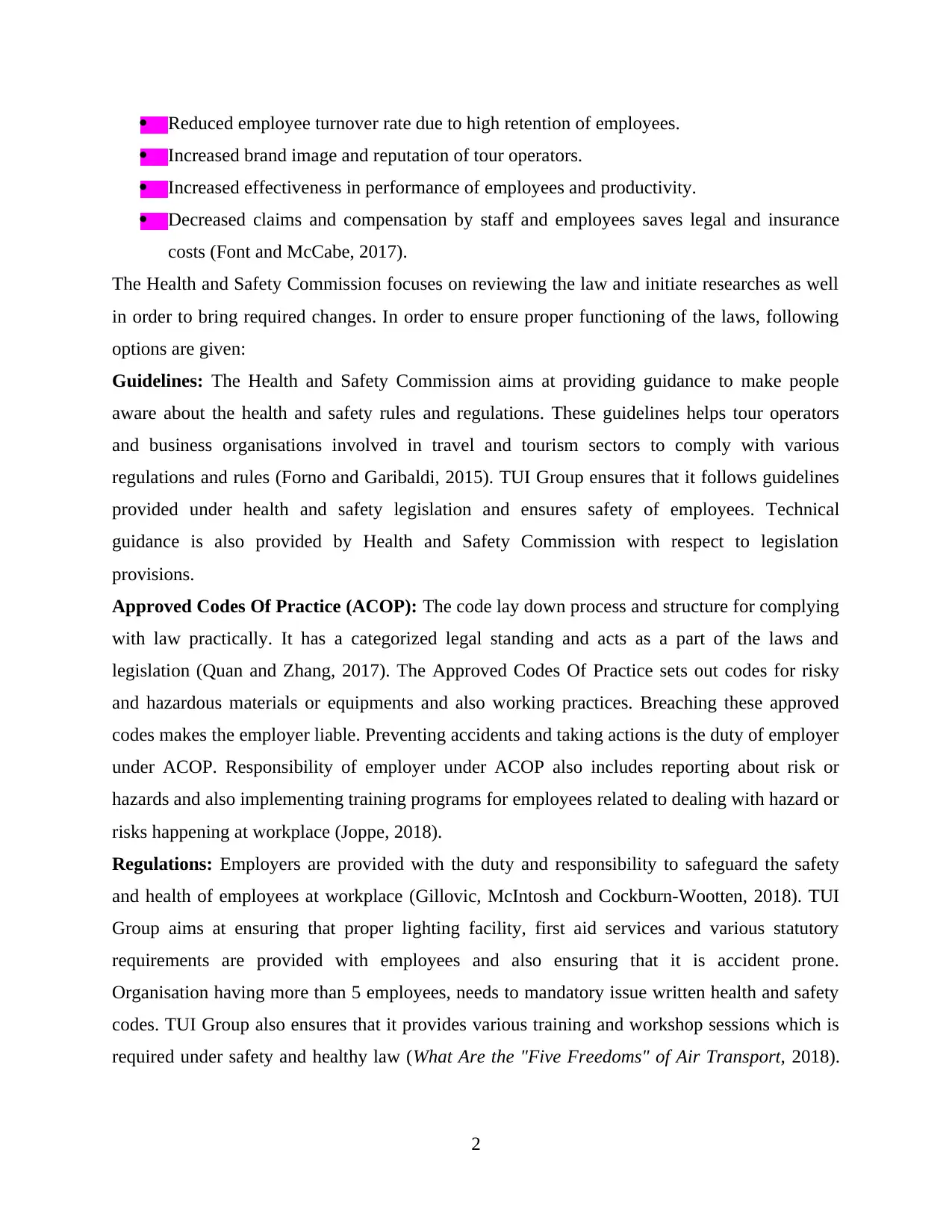
Reduced employee turnover rate due to high retention of employees.
Increased brand image and reputation of tour operators.
Increased effectiveness in performance of employees and productivity.
Decreased claims and compensation by staff and employees saves legal and insurance
costs (Font and McCabe, 2017).
The Health and Safety Commission focuses on reviewing the law and initiate researches as well
in order to bring required changes. In order to ensure proper functioning of the laws, following
options are given:
Guidelines: The Health and Safety Commission aims at providing guidance to make people
aware about the health and safety rules and regulations. These guidelines helps tour operators
and business organisations involved in travel and tourism sectors to comply with various
regulations and rules (Forno and Garibaldi, 2015). TUI Group ensures that it follows guidelines
provided under health and safety legislation and ensures safety of employees. Technical
guidance is also provided by Health and Safety Commission with respect to legislation
provisions.
Approved Codes Of Practice (ACOP): The code lay down process and structure for complying
with law practically. It has a categorized legal standing and acts as a part of the laws and
legislation (Quan and Zhang, 2017). The Approved Codes Of Practice sets out codes for risky
and hazardous materials or equipments and also working practices. Breaching these approved
codes makes the employer liable. Preventing accidents and taking actions is the duty of employer
under ACOP. Responsibility of employer under ACOP also includes reporting about risk or
hazards and also implementing training programs for employees related to dealing with hazard or
risks happening at workplace (Joppe, 2018).
Regulations: Employers are provided with the duty and responsibility to safeguard the safety
and health of employees at workplace (Gillovic, McIntosh and Cockburn-Wootten, 2018). TUI
Group aims at ensuring that proper lighting facility, first aid services and various statutory
requirements are provided with employees and also ensuring that it is accident prone.
Organisation having more than 5 employees, needs to mandatory issue written health and safety
codes. TUI Group also ensures that it provides various training and workshop sessions which is
required under safety and healthy law (What Are the "Five Freedoms" of Air Transport, 2018).
2
Increased brand image and reputation of tour operators.
Increased effectiveness in performance of employees and productivity.
Decreased claims and compensation by staff and employees saves legal and insurance
costs (Font and McCabe, 2017).
The Health and Safety Commission focuses on reviewing the law and initiate researches as well
in order to bring required changes. In order to ensure proper functioning of the laws, following
options are given:
Guidelines: The Health and Safety Commission aims at providing guidance to make people
aware about the health and safety rules and regulations. These guidelines helps tour operators
and business organisations involved in travel and tourism sectors to comply with various
regulations and rules (Forno and Garibaldi, 2015). TUI Group ensures that it follows guidelines
provided under health and safety legislation and ensures safety of employees. Technical
guidance is also provided by Health and Safety Commission with respect to legislation
provisions.
Approved Codes Of Practice (ACOP): The code lay down process and structure for complying
with law practically. It has a categorized legal standing and acts as a part of the laws and
legislation (Quan and Zhang, 2017). The Approved Codes Of Practice sets out codes for risky
and hazardous materials or equipments and also working practices. Breaching these approved
codes makes the employer liable. Preventing accidents and taking actions is the duty of employer
under ACOP. Responsibility of employer under ACOP also includes reporting about risk or
hazards and also implementing training programs for employees related to dealing with hazard or
risks happening at workplace (Joppe, 2018).
Regulations: Employers are provided with the duty and responsibility to safeguard the safety
and health of employees at workplace (Gillovic, McIntosh and Cockburn-Wootten, 2018). TUI
Group aims at ensuring that proper lighting facility, first aid services and various statutory
requirements are provided with employees and also ensuring that it is accident prone.
Organisation having more than 5 employees, needs to mandatory issue written health and safety
codes. TUI Group also ensures that it provides various training and workshop sessions which is
required under safety and healthy law (What Are the "Five Freedoms" of Air Transport, 2018).
2
Paraphrase This Document
Need a fresh take? Get an instant paraphrase of this document with our AI Paraphraser
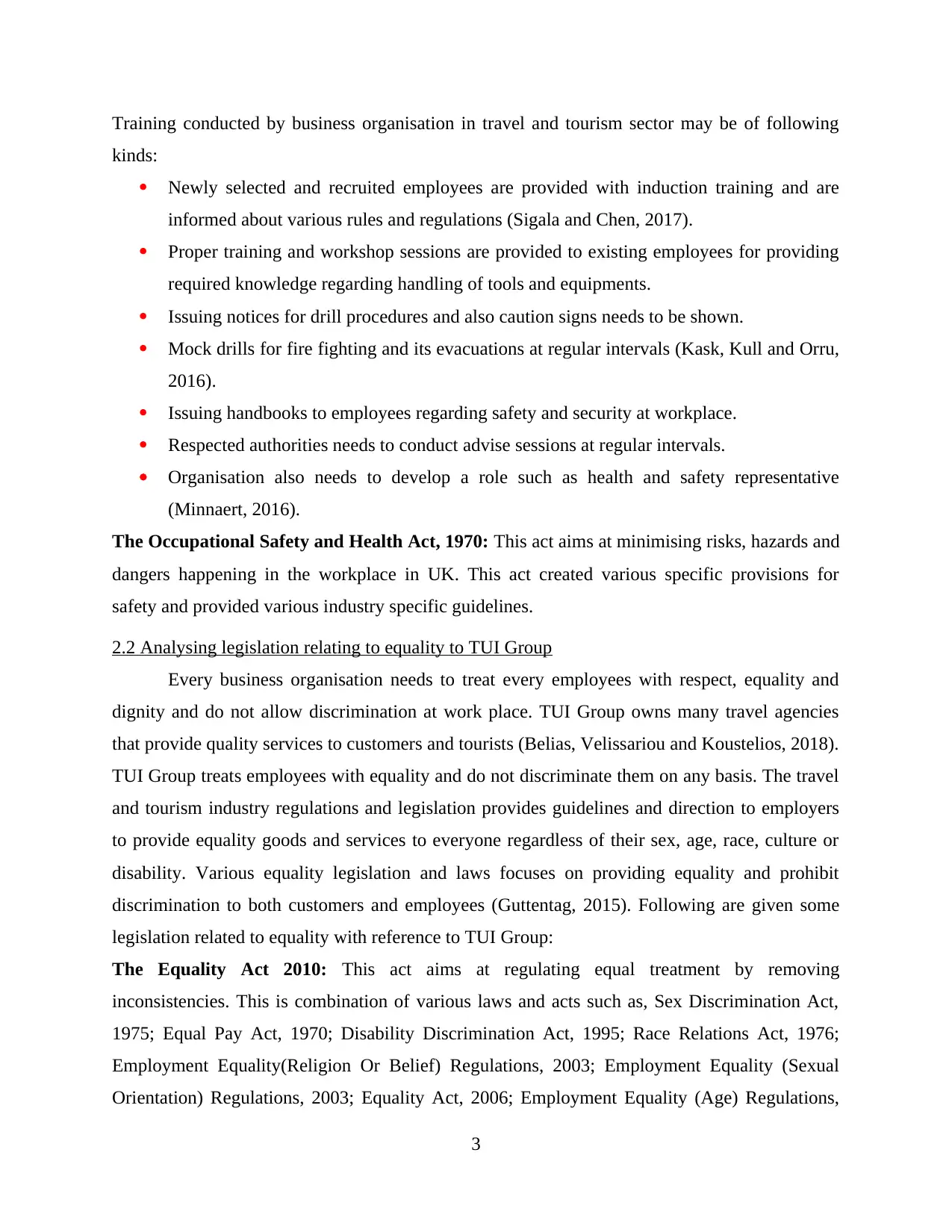
Training conducted by business organisation in travel and tourism sector may be of following
kinds:
Newly selected and recruited employees are provided with induction training and are
informed about various rules and regulations (Sigala and Chen, 2017).
Proper training and workshop sessions are provided to existing employees for providing
required knowledge regarding handling of tools and equipments.
Issuing notices for drill procedures and also caution signs needs to be shown.
Mock drills for fire fighting and its evacuations at regular intervals (Kask, Kull and Orru,
2016).
Issuing handbooks to employees regarding safety and security at workplace.
Respected authorities needs to conduct advise sessions at regular intervals.
Organisation also needs to develop a role such as health and safety representative
(Minnaert, 2016).
The Occupational Safety and Health Act, 1970: This act aims at minimising risks, hazards and
dangers happening in the workplace in UK. This act created various specific provisions for
safety and provided various industry specific guidelines.
2.2 Analysing legislation relating to equality to TUI Group
Every business organisation needs to treat every employees with respect, equality and
dignity and do not allow discrimination at work place. TUI Group owns many travel agencies
that provide quality services to customers and tourists (Belias, Velissariou and Koustelios, 2018).
TUI Group treats employees with equality and do not discriminate them on any basis. The travel
and tourism industry regulations and legislation provides guidelines and direction to employers
to provide equality goods and services to everyone regardless of their sex, age, race, culture or
disability. Various equality legislation and laws focuses on providing equality and prohibit
discrimination to both customers and employees (Guttentag, 2015). Following are given some
legislation related to equality with reference to TUI Group:
The Equality Act 2010: This act aims at regulating equal treatment by removing
inconsistencies. This is combination of various laws and acts such as, Sex Discrimination Act,
1975; Equal Pay Act, 1970; Disability Discrimination Act, 1995; Race Relations Act, 1976;
Employment Equality(Religion Or Belief) Regulations, 2003; Employment Equality (Sexual
Orientation) Regulations, 2003; Equality Act, 2006; Employment Equality (Age) Regulations,
3
kinds:
Newly selected and recruited employees are provided with induction training and are
informed about various rules and regulations (Sigala and Chen, 2017).
Proper training and workshop sessions are provided to existing employees for providing
required knowledge regarding handling of tools and equipments.
Issuing notices for drill procedures and also caution signs needs to be shown.
Mock drills for fire fighting and its evacuations at regular intervals (Kask, Kull and Orru,
2016).
Issuing handbooks to employees regarding safety and security at workplace.
Respected authorities needs to conduct advise sessions at regular intervals.
Organisation also needs to develop a role such as health and safety representative
(Minnaert, 2016).
The Occupational Safety and Health Act, 1970: This act aims at minimising risks, hazards and
dangers happening in the workplace in UK. This act created various specific provisions for
safety and provided various industry specific guidelines.
2.2 Analysing legislation relating to equality to TUI Group
Every business organisation needs to treat every employees with respect, equality and
dignity and do not allow discrimination at work place. TUI Group owns many travel agencies
that provide quality services to customers and tourists (Belias, Velissariou and Koustelios, 2018).
TUI Group treats employees with equality and do not discriminate them on any basis. The travel
and tourism industry regulations and legislation provides guidelines and direction to employers
to provide equality goods and services to everyone regardless of their sex, age, race, culture or
disability. Various equality legislation and laws focuses on providing equality and prohibit
discrimination to both customers and employees (Guttentag, 2015). Following are given some
legislation related to equality with reference to TUI Group:
The Equality Act 2010: This act aims at regulating equal treatment by removing
inconsistencies. This is combination of various laws and acts such as, Sex Discrimination Act,
1975; Equal Pay Act, 1970; Disability Discrimination Act, 1995; Race Relations Act, 1976;
Employment Equality(Religion Or Belief) Regulations, 2003; Employment Equality (Sexual
Orientation) Regulations, 2003; Equality Act, 2006; Employment Equality (Age) Regulations,
3
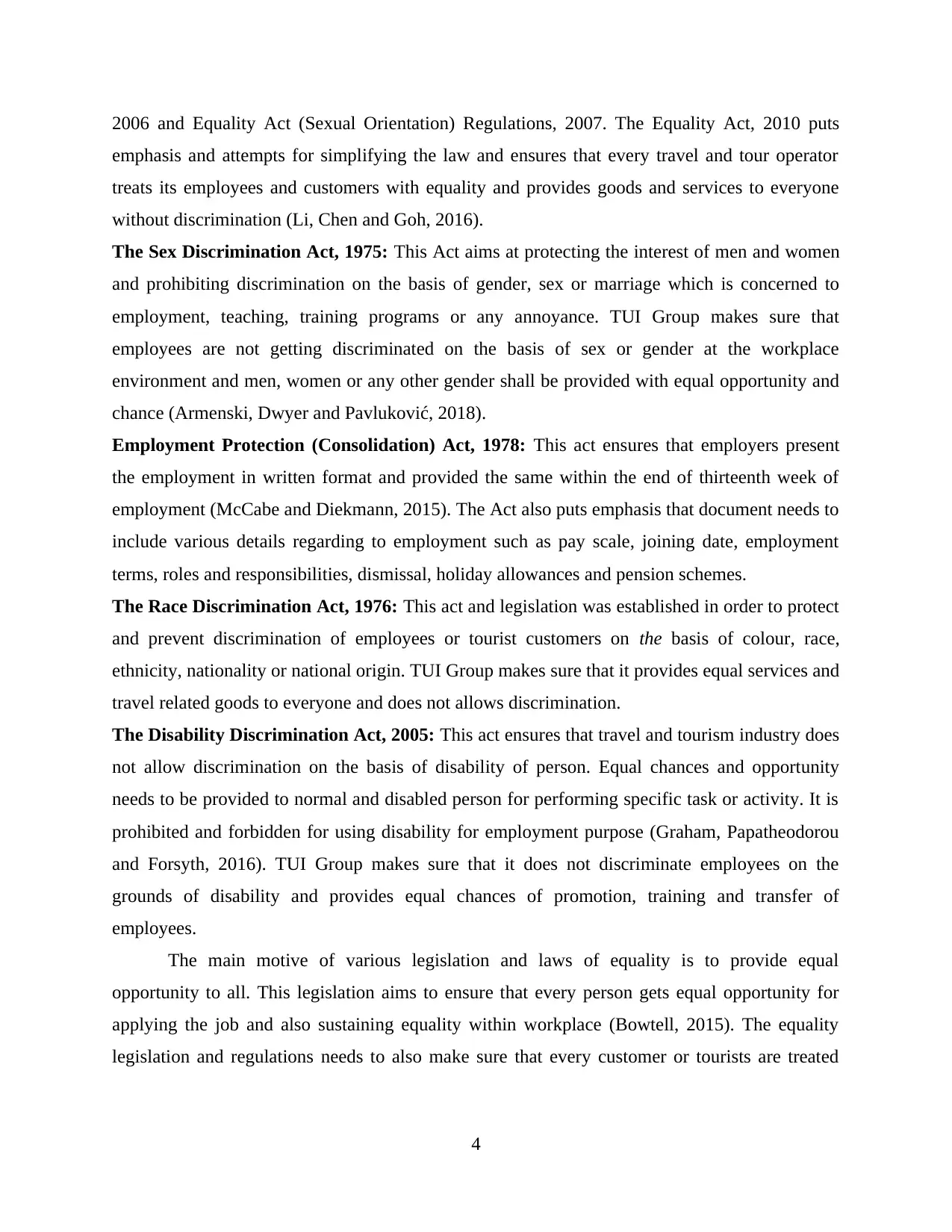
2006 and Equality Act (Sexual Orientation) Regulations, 2007. The Equality Act, 2010 puts
emphasis and attempts for simplifying the law and ensures that every travel and tour operator
treats its employees and customers with equality and provides goods and services to everyone
without discrimination (Li, Chen and Goh, 2016).
The Sex Discrimination Act, 1975: This Act aims at protecting the interest of men and women
and prohibiting discrimination on the basis of gender, sex or marriage which is concerned to
employment, teaching, training programs or any annoyance. TUI Group makes sure that
employees are not getting discriminated on the basis of sex or gender at the workplace
environment and men, women or any other gender shall be provided with equal opportunity and
chance (Armenski, Dwyer and Pavluković, 2018).
Employment Protection (Consolidation) Act, 1978: This act ensures that employers present
the employment in written format and provided the same within the end of thirteenth week of
employment (McCabe and Diekmann, 2015). The Act also puts emphasis that document needs to
include various details regarding to employment such as pay scale, joining date, employment
terms, roles and responsibilities, dismissal, holiday allowances and pension schemes.
The Race Discrimination Act, 1976: This act and legislation was established in order to protect
and prevent discrimination of employees or tourist customers on the basis of colour, race,
ethnicity, nationality or national origin. TUI Group makes sure that it provides equal services and
travel related goods to everyone and does not allows discrimination.
The Disability Discrimination Act, 2005: This act ensures that travel and tourism industry does
not allow discrimination on the basis of disability of person. Equal chances and opportunity
needs to be provided to normal and disabled person for performing specific task or activity. It is
prohibited and forbidden for using disability for employment purpose (Graham, Papatheodorou
and Forsyth, 2016). TUI Group makes sure that it does not discriminate employees on the
grounds of disability and provides equal chances of promotion, training and transfer of
employees.
The main motive of various legislation and laws of equality is to provide equal
opportunity to all. This legislation aims to ensure that every person gets equal opportunity for
applying the job and also sustaining equality within workplace (Bowtell, 2015). The equality
legislation and regulations needs to also make sure that every customer or tourists are treated
4
emphasis and attempts for simplifying the law and ensures that every travel and tour operator
treats its employees and customers with equality and provides goods and services to everyone
without discrimination (Li, Chen and Goh, 2016).
The Sex Discrimination Act, 1975: This Act aims at protecting the interest of men and women
and prohibiting discrimination on the basis of gender, sex or marriage which is concerned to
employment, teaching, training programs or any annoyance. TUI Group makes sure that
employees are not getting discriminated on the basis of sex or gender at the workplace
environment and men, women or any other gender shall be provided with equal opportunity and
chance (Armenski, Dwyer and Pavluković, 2018).
Employment Protection (Consolidation) Act, 1978: This act ensures that employers present
the employment in written format and provided the same within the end of thirteenth week of
employment (McCabe and Diekmann, 2015). The Act also puts emphasis that document needs to
include various details regarding to employment such as pay scale, joining date, employment
terms, roles and responsibilities, dismissal, holiday allowances and pension schemes.
The Race Discrimination Act, 1976: This act and legislation was established in order to protect
and prevent discrimination of employees or tourist customers on the basis of colour, race,
ethnicity, nationality or national origin. TUI Group makes sure that it provides equal services and
travel related goods to everyone and does not allows discrimination.
The Disability Discrimination Act, 2005: This act ensures that travel and tourism industry does
not allow discrimination on the basis of disability of person. Equal chances and opportunity
needs to be provided to normal and disabled person for performing specific task or activity. It is
prohibited and forbidden for using disability for employment purpose (Graham, Papatheodorou
and Forsyth, 2016). TUI Group makes sure that it does not discriminate employees on the
grounds of disability and provides equal chances of promotion, training and transfer of
employees.
The main motive of various legislation and laws of equality is to provide equal
opportunity to all. This legislation aims to ensure that every person gets equal opportunity for
applying the job and also sustaining equality within workplace (Bowtell, 2015). The equality
legislation and regulations needs to also make sure that every customer or tourists are treated
4
⊘ This is a preview!⊘
Do you want full access?
Subscribe today to unlock all pages.

Trusted by 1+ million students worldwide
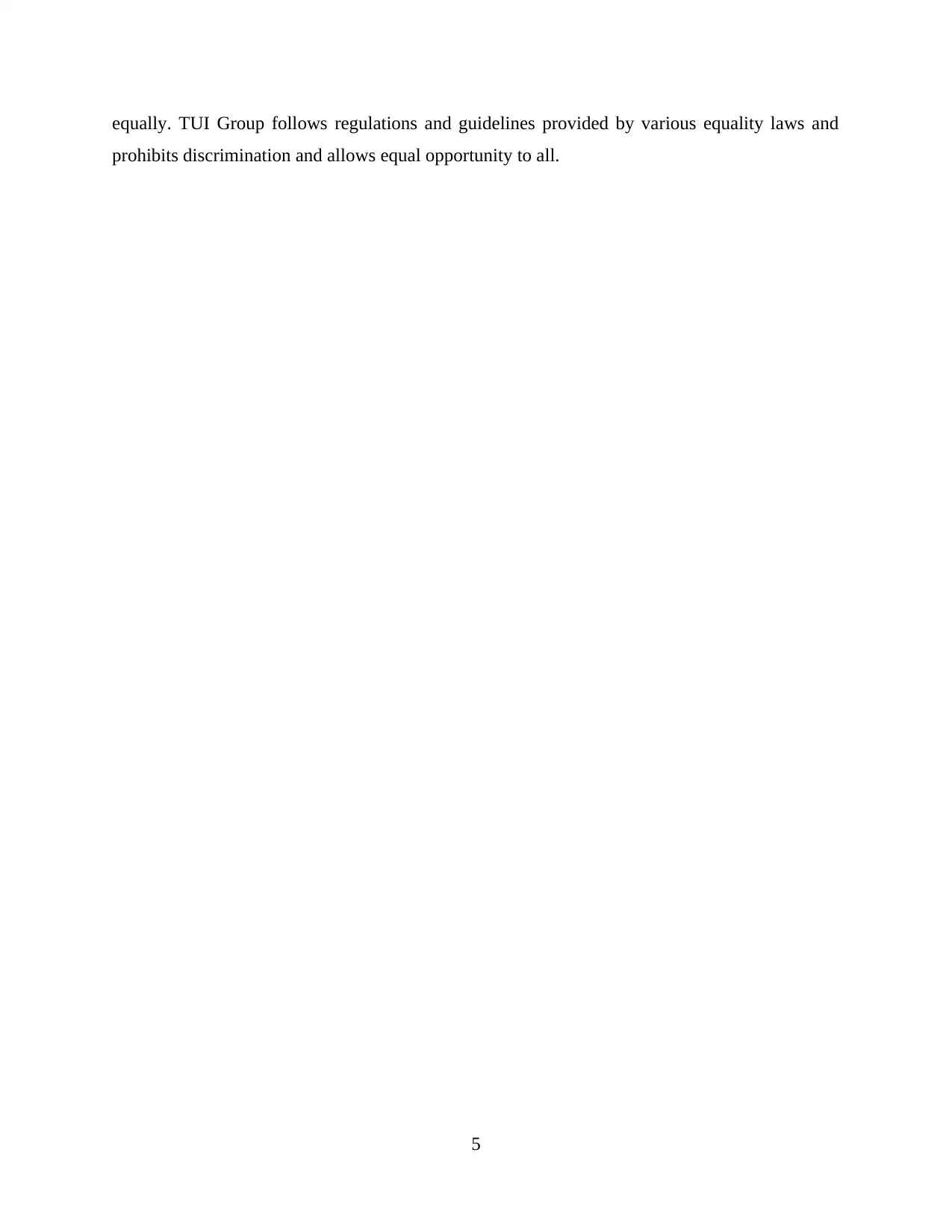
equally. TUI Group follows regulations and guidelines provided by various equality laws and
prohibits discrimination and allows equal opportunity to all.
5
prohibits discrimination and allows equal opportunity to all.
5
Paraphrase This Document
Need a fresh take? Get an instant paraphrase of this document with our AI Paraphraser
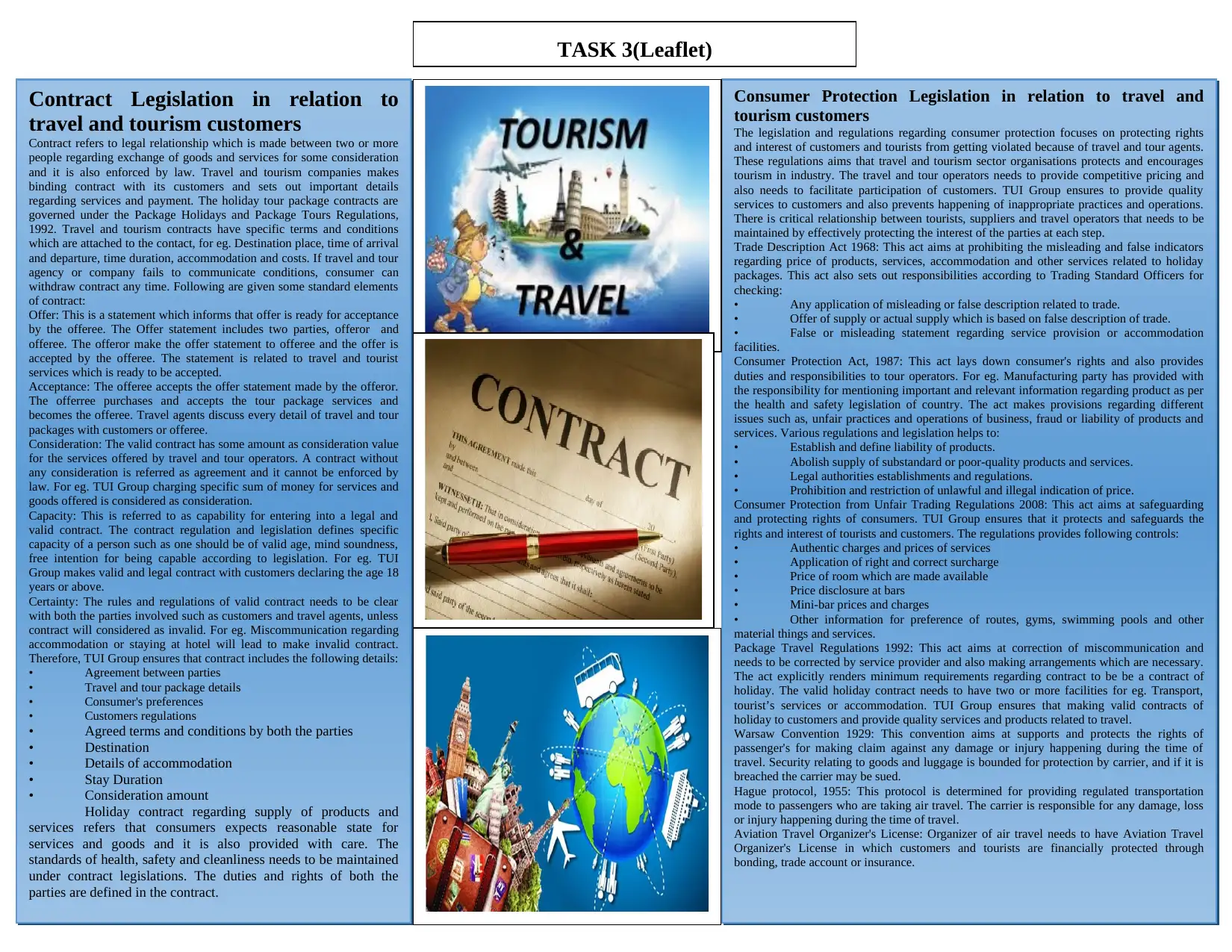
1
Contract Legislation in relation to
travel and tourism customers
Contract refers to legal relationship which is made between two or more
people regarding exchange of goods and services for some consideration
and it is also enforced by law. Travel and tourism companies makes
binding contract with its customers and sets out important details
regarding services and payment. The holiday tour package contracts are
governed under the Package Holidays and Package Tours Regulations,
1992. Travel and tourism contracts have specific terms and conditions
which are attached to the contact, for eg. Destination place, time of arrival
and departure, time duration, accommodation and costs. If travel and tour
agency or company fails to communicate conditions, consumer can
withdraw contract any time. Following are given some standard elements
of contract:
Offer: This is a statement which informs that offer is ready for acceptance
by the offeree. The Offer statement includes two parties, offeror and
offeree. The offeror make the offer statement to offeree and the offer is
accepted by the offeree. The statement is related to travel and tourist
services which is ready to be accepted.
Acceptance: The offeree accepts the offer statement made by the offeror.
The offerree purchases and accepts the tour package services and
becomes the offeree. Travel agents discuss every detail of travel and tour
packages with customers or offeree.
Consideration: The valid contract has some amount as consideration value
for the services offered by travel and tour operators. A contract without
any consideration is referred as agreement and it cannot be enforced by
law. For eg. TUI Group charging specific sum of money for services and
goods offered is considered as consideration.
Capacity: This is referred to as capability for entering into a legal and
valid contract. The contract regulation and legislation defines specific
capacity of a person such as one should be of valid age, mind soundness,
free intention for being capable according to legislation. For eg. TUI
Group makes valid and legal contract with customers declaring the age 18
years or above.
Certainty: The rules and regulations of valid contract needs to be clear
with both the parties involved such as customers and travel agents, unless
contract will considered as invalid. For eg. Miscommunication regarding
accommodation or staying at hotel will lead to make invalid contract.
Therefore, TUI Group ensures that contract includes the following details:
• Agreement between parties
• Travel and tour package details
• Consumer's preferences
• Customers regulations
• Agreed terms and conditions by both the parties
• Destination
• Details of accommodation
• Stay Duration
• Consideration amount
Holiday contract regarding supply of products and
services refers that consumers expects reasonable state for
services and goods and it is also provided with care. The
standards of health, safety and cleanliness needs to be maintained
under contract legislations. The duties and rights of both the
parties are defined in the contract.
Consumer Protection Legislation in relation to travel and
tourism customers
The legislation and regulations regarding consumer protection focuses on protecting rights
and interest of customers and tourists from getting violated because of travel and tour agents.
These regulations aims that travel and tourism sector organisations protects and encourages
tourism in industry. The travel and tour operators needs to provide competitive pricing and
also needs to facilitate participation of customers. TUI Group ensures to provide quality
services to customers and also prevents happening of inappropriate practices and operations.
There is critical relationship between tourists, suppliers and travel operators that needs to be
maintained by effectively protecting the interest of the parties at each step.
Trade Description Act 1968: This act aims at prohibiting the misleading and false indicators
regarding price of products, services, accommodation and other services related to holiday
packages. This act also sets out responsibilities according to Trading Standard Officers for
checking:
• Any application of misleading or false description related to trade.
• Offer of supply or actual supply which is based on false description of trade.
• False or misleading statement regarding service provision or accommodation
facilities.
Consumer Protection Act, 1987: This act lays down consumer's rights and also provides
duties and responsibilities to tour operators. For eg. Manufacturing party has provided with
the responsibility for mentioning important and relevant information regarding product as per
the health and safety legislation of country. The act makes provisions regarding different
issues such as, unfair practices and operations of business, fraud or liability of products and
services. Various regulations and legislation helps to:
• Establish and define liability of products.
• Abolish supply of substandard or poor-quality products and services.
• Legal authorities establishments and regulations.
• Prohibition and restriction of unlawful and illegal indication of price.
Consumer Protection from Unfair Trading Regulations 2008: This act aims at safeguarding
and protecting rights of consumers. TUI Group ensures that it protects and safeguards the
rights and interest of tourists and customers. The regulations provides following controls:
• Authentic charges and prices of services
• Application of right and correct surcharge
• Price of room which are made available
• Price disclosure at bars
• Mini-bar prices and charges
• Other information for preference of routes, gyms, swimming pools and other
material things and services.
Package Travel Regulations 1992: This act aims at correction of miscommunication and
needs to be corrected by service provider and also making arrangements which are necessary.
The act explicitly renders minimum requirements regarding contract to be be a contract of
holiday. The valid holiday contract needs to have two or more facilities for eg. Transport,
tourist’s services or accommodation. TUI Group ensures that making valid contracts of
holiday to customers and provide quality services and products related to travel.
Warsaw Convention 1929: This convention aims at supports and protects the rights of
passenger's for making claim against any damage or injury happening during the time of
travel. Security relating to goods and luggage is bounded for protection by carrier, and if it is
breached the carrier may be sued.
Hague protocol, 1955: This protocol is determined for providing regulated transportation
mode to passengers who are taking air travel. The carrier is responsible for any damage, loss
or injury happening during the time of travel.
Aviation Travel Organizer's License: Organizer of air travel needs to have Aviation Travel
Organizer's License in which customers and tourists are financially protected through
bonding, trade account or insurance.
TASK 3(Leaflet)
Contract Legislation in relation to
travel and tourism customers
Contract refers to legal relationship which is made between two or more
people regarding exchange of goods and services for some consideration
and it is also enforced by law. Travel and tourism companies makes
binding contract with its customers and sets out important details
regarding services and payment. The holiday tour package contracts are
governed under the Package Holidays and Package Tours Regulations,
1992. Travel and tourism contracts have specific terms and conditions
which are attached to the contact, for eg. Destination place, time of arrival
and departure, time duration, accommodation and costs. If travel and tour
agency or company fails to communicate conditions, consumer can
withdraw contract any time. Following are given some standard elements
of contract:
Offer: This is a statement which informs that offer is ready for acceptance
by the offeree. The Offer statement includes two parties, offeror and
offeree. The offeror make the offer statement to offeree and the offer is
accepted by the offeree. The statement is related to travel and tourist
services which is ready to be accepted.
Acceptance: The offeree accepts the offer statement made by the offeror.
The offerree purchases and accepts the tour package services and
becomes the offeree. Travel agents discuss every detail of travel and tour
packages with customers or offeree.
Consideration: The valid contract has some amount as consideration value
for the services offered by travel and tour operators. A contract without
any consideration is referred as agreement and it cannot be enforced by
law. For eg. TUI Group charging specific sum of money for services and
goods offered is considered as consideration.
Capacity: This is referred to as capability for entering into a legal and
valid contract. The contract regulation and legislation defines specific
capacity of a person such as one should be of valid age, mind soundness,
free intention for being capable according to legislation. For eg. TUI
Group makes valid and legal contract with customers declaring the age 18
years or above.
Certainty: The rules and regulations of valid contract needs to be clear
with both the parties involved such as customers and travel agents, unless
contract will considered as invalid. For eg. Miscommunication regarding
accommodation or staying at hotel will lead to make invalid contract.
Therefore, TUI Group ensures that contract includes the following details:
• Agreement between parties
• Travel and tour package details
• Consumer's preferences
• Customers regulations
• Agreed terms and conditions by both the parties
• Destination
• Details of accommodation
• Stay Duration
• Consideration amount
Holiday contract regarding supply of products and
services refers that consumers expects reasonable state for
services and goods and it is also provided with care. The
standards of health, safety and cleanliness needs to be maintained
under contract legislations. The duties and rights of both the
parties are defined in the contract.
Consumer Protection Legislation in relation to travel and
tourism customers
The legislation and regulations regarding consumer protection focuses on protecting rights
and interest of customers and tourists from getting violated because of travel and tour agents.
These regulations aims that travel and tourism sector organisations protects and encourages
tourism in industry. The travel and tour operators needs to provide competitive pricing and
also needs to facilitate participation of customers. TUI Group ensures to provide quality
services to customers and also prevents happening of inappropriate practices and operations.
There is critical relationship between tourists, suppliers and travel operators that needs to be
maintained by effectively protecting the interest of the parties at each step.
Trade Description Act 1968: This act aims at prohibiting the misleading and false indicators
regarding price of products, services, accommodation and other services related to holiday
packages. This act also sets out responsibilities according to Trading Standard Officers for
checking:
• Any application of misleading or false description related to trade.
• Offer of supply or actual supply which is based on false description of trade.
• False or misleading statement regarding service provision or accommodation
facilities.
Consumer Protection Act, 1987: This act lays down consumer's rights and also provides
duties and responsibilities to tour operators. For eg. Manufacturing party has provided with
the responsibility for mentioning important and relevant information regarding product as per
the health and safety legislation of country. The act makes provisions regarding different
issues such as, unfair practices and operations of business, fraud or liability of products and
services. Various regulations and legislation helps to:
• Establish and define liability of products.
• Abolish supply of substandard or poor-quality products and services.
• Legal authorities establishments and regulations.
• Prohibition and restriction of unlawful and illegal indication of price.
Consumer Protection from Unfair Trading Regulations 2008: This act aims at safeguarding
and protecting rights of consumers. TUI Group ensures that it protects and safeguards the
rights and interest of tourists and customers. The regulations provides following controls:
• Authentic charges and prices of services
• Application of right and correct surcharge
• Price of room which are made available
• Price disclosure at bars
• Mini-bar prices and charges
• Other information for preference of routes, gyms, swimming pools and other
material things and services.
Package Travel Regulations 1992: This act aims at correction of miscommunication and
needs to be corrected by service provider and also making arrangements which are necessary.
The act explicitly renders minimum requirements regarding contract to be be a contract of
holiday. The valid holiday contract needs to have two or more facilities for eg. Transport,
tourist’s services or accommodation. TUI Group ensures that making valid contracts of
holiday to customers and provide quality services and products related to travel.
Warsaw Convention 1929: This convention aims at supports and protects the rights of
passenger's for making claim against any damage or injury happening during the time of
travel. Security relating to goods and luggage is bounded for protection by carrier, and if it is
breached the carrier may be sued.
Hague protocol, 1955: This protocol is determined for providing regulated transportation
mode to passengers who are taking air travel. The carrier is responsible for any damage, loss
or injury happening during the time of travel.
Aviation Travel Organizer's License: Organizer of air travel needs to have Aviation Travel
Organizer's License in which customers and tourists are financially protected through
bonding, trade account or insurance.
TASK 3(Leaflet)
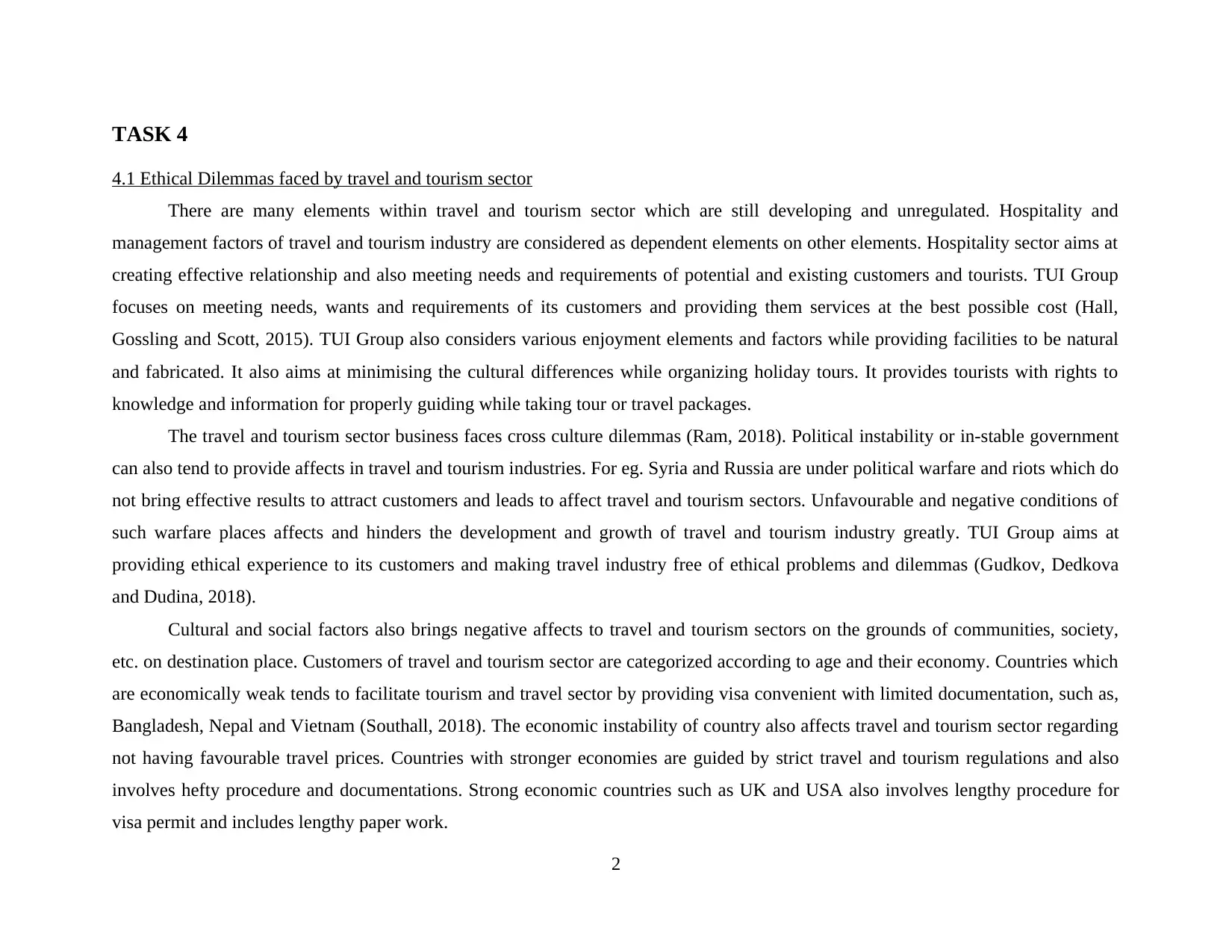
TASK 4
4.1 Ethical Dilemmas faced by travel and tourism sector
There are many elements within travel and tourism sector which are still developing and unregulated. Hospitality and
management factors of travel and tourism industry are considered as dependent elements on other elements. Hospitality sector aims at
creating effective relationship and also meeting needs and requirements of potential and existing customers and tourists. TUI Group
focuses on meeting needs, wants and requirements of its customers and providing them services at the best possible cost (Hall,
Gossling and Scott, 2015). TUI Group also considers various enjoyment elements and factors while providing facilities to be natural
and fabricated. It also aims at minimising the cultural differences while organizing holiday tours. It provides tourists with rights to
knowledge and information for properly guiding while taking tour or travel packages.
The travel and tourism sector business faces cross culture dilemmas (Ram, 2018). Political instability or in-stable government
can also tend to provide affects in travel and tourism industries. For eg. Syria and Russia are under political warfare and riots which do
not bring effective results to attract customers and leads to affect travel and tourism sectors. Unfavourable and negative conditions of
such warfare places affects and hinders the development and growth of travel and tourism industry greatly. TUI Group aims at
providing ethical experience to its customers and making travel industry free of ethical problems and dilemmas (Gudkov, Dedkova
and Dudina, 2018).
Cultural and social factors also brings negative affects to travel and tourism sectors on the grounds of communities, society,
etc. on destination place. Customers of travel and tourism sector are categorized according to age and their economy. Countries which
are economically weak tends to facilitate tourism and travel sector by providing visa convenient with limited documentation, such as,
Bangladesh, Nepal and Vietnam (Southall, 2018). The economic instability of country also affects travel and tourism sector regarding
not having favourable travel prices. Countries with stronger economies are guided by strict travel and tourism regulations and also
involves hefty procedure and documentations. Strong economic countries such as UK and USA also involves lengthy procedure for
visa permit and includes lengthy paper work.
2
4.1 Ethical Dilemmas faced by travel and tourism sector
There are many elements within travel and tourism sector which are still developing and unregulated. Hospitality and
management factors of travel and tourism industry are considered as dependent elements on other elements. Hospitality sector aims at
creating effective relationship and also meeting needs and requirements of potential and existing customers and tourists. TUI Group
focuses on meeting needs, wants and requirements of its customers and providing them services at the best possible cost (Hall,
Gossling and Scott, 2015). TUI Group also considers various enjoyment elements and factors while providing facilities to be natural
and fabricated. It also aims at minimising the cultural differences while organizing holiday tours. It provides tourists with rights to
knowledge and information for properly guiding while taking tour or travel packages.
The travel and tourism sector business faces cross culture dilemmas (Ram, 2018). Political instability or in-stable government
can also tend to provide affects in travel and tourism industries. For eg. Syria and Russia are under political warfare and riots which do
not bring effective results to attract customers and leads to affect travel and tourism sectors. Unfavourable and negative conditions of
such warfare places affects and hinders the development and growth of travel and tourism industry greatly. TUI Group aims at
providing ethical experience to its customers and making travel industry free of ethical problems and dilemmas (Gudkov, Dedkova
and Dudina, 2018).
Cultural and social factors also brings negative affects to travel and tourism sectors on the grounds of communities, society,
etc. on destination place. Customers of travel and tourism sector are categorized according to age and their economy. Countries which
are economically weak tends to facilitate tourism and travel sector by providing visa convenient with limited documentation, such as,
Bangladesh, Nepal and Vietnam (Southall, 2018). The economic instability of country also affects travel and tourism sector regarding
not having favourable travel prices. Countries with stronger economies are guided by strict travel and tourism regulations and also
involves hefty procedure and documentations. Strong economic countries such as UK and USA also involves lengthy procedure for
visa permit and includes lengthy paper work.
2
⊘ This is a preview!⊘
Do you want full access?
Subscribe today to unlock all pages.

Trusted by 1+ million students worldwide
1 out of 21
Related Documents
Your All-in-One AI-Powered Toolkit for Academic Success.
+13062052269
info@desklib.com
Available 24*7 on WhatsApp / Email
![[object Object]](/_next/static/media/star-bottom.7253800d.svg)
Unlock your academic potential
Copyright © 2020–2026 A2Z Services. All Rights Reserved. Developed and managed by ZUCOL.




